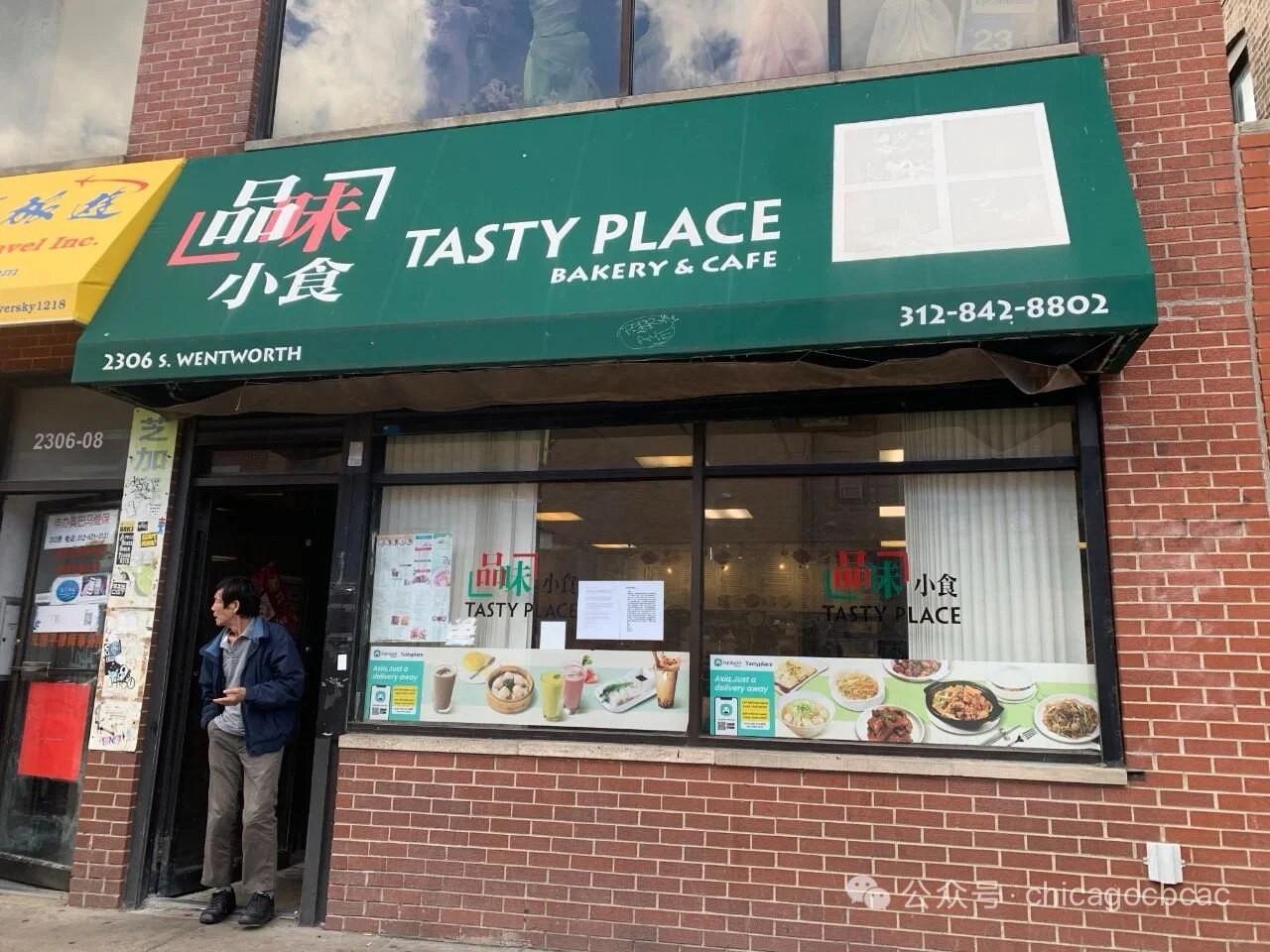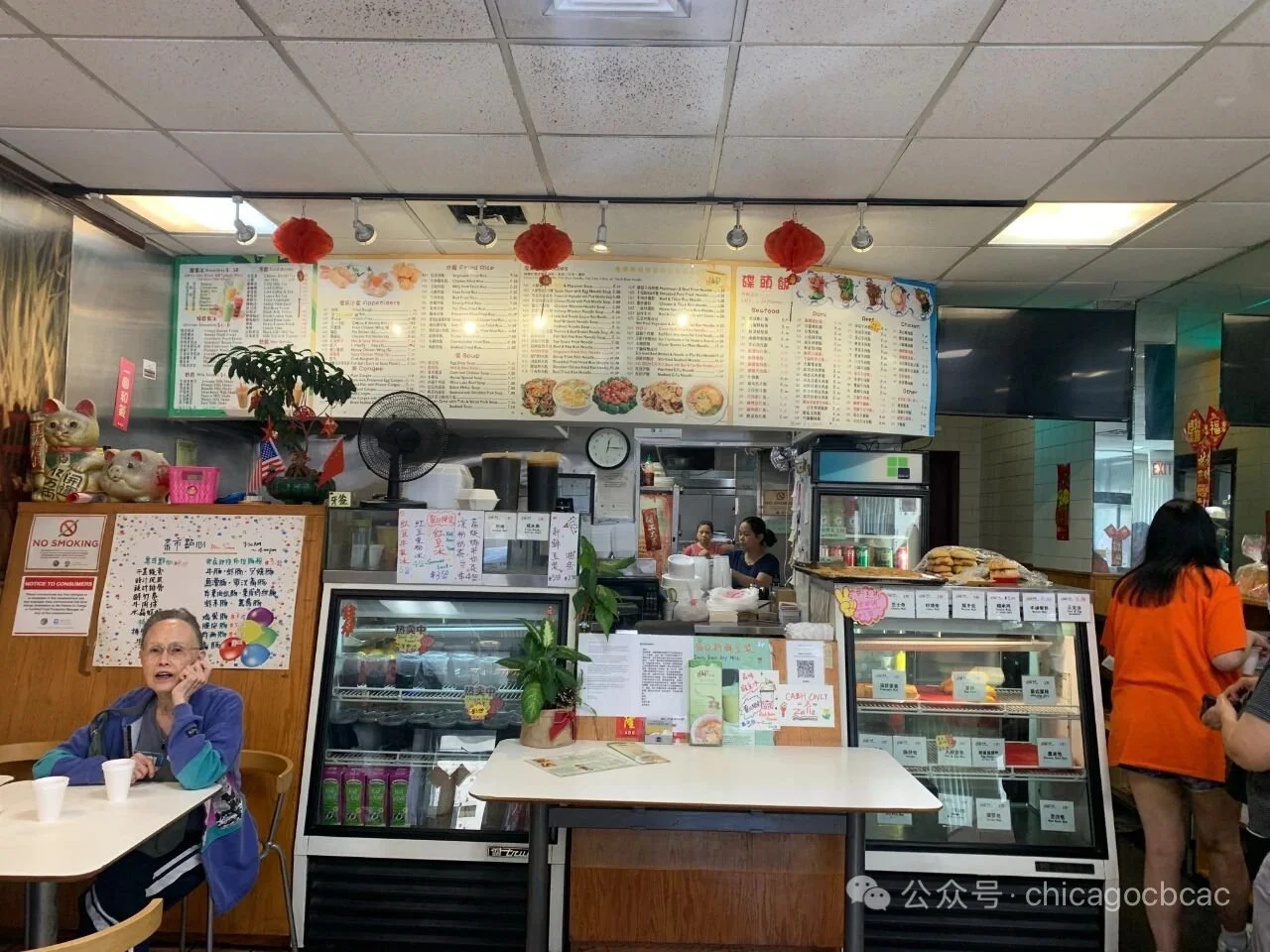After 18 Years, the Everyday Flavors Fade: Another Old-Style Cantonese Café Bids Farewell to Chicago’s Chinatown
Original by Xizhi
9/5/2025 18:00
Tasty Place, located in 2306 S Wentworth Ave, will be closed by the end of September.
If you have $10, what can you buy today in Chicago’s Chinatown?
Maybe you could get one or two small trinkets, or a cup of bubble tea with toppings. But if you want to use that $10 to buy yourself a proper meal, that might not be so easy. Still, in a small, unassuming shop, you can get a Cantonese-style lunchbox for about $8—packed full, with a complimentary soup on the side. That shop is Tasty Place, located at 23rd Street and Wentworth Avenue (2306 S Wentworth Ave).
If you’ve never been there and want to try their $8 lunchbox or a plate of their flavorful specialty Beef Chow Fun, you’ll need to hurry. After 18 years of business in Chinatown, the little restaurant will close its doors on September 28.
Last year, the closure of another Cantonese eatery, Seven Treasures, became headline news in the community. On social media, many young people reminisced about the yellow “Seven Treasures” sign that had been part of their childhood. Tasty Place, being smaller and with a shorter history, hasn’t sparked as much online buzz with its closure news.
But when I walked into Tasty Place and sat down to chat with elders sipping Hong Kong-style milk tea, the true impact of the closure on their daily lives became clear.
“We come almost every day.”
Inside Tasty Place, there are five small tables on each side, each seating about four to five people. Straight ahead is the cashier, and behind it, the open kitchen. You can see the chef flipping the wok with effort and hear the sizzling sound of fire leaping up.
The interior view of Tasty Place
It’s just past noon, the peak lunch hour. The shop is crowded: every table is full, and a line of takeout customers snakes between the tables, sometimes reaching all the way to the door. Two aunties usually run the front during the day—taking orders, handling the register, and bringing dishes out from the kitchen. After 5 p.m., Janet, Tasty’s owner, comes to help in person. In the cramped space, when they deliver dishes, they weave through the waiting crowd calling out “excuse me” in a Cantonese accent.
At the table near the entrance sit Auntie Tang and Auntie Li. They live in Chinatown’s affordable housing complex Hilliard Towers and walk over to Wentworth for food.
“We come almost every day,” said Auntie Tang. “Sometimes not even for a full meal—just a cup of milk tea and some snacks. She (Auntie Li) is waiting for chicken wings right now.”
“The portions here are huge,” added Auntie Li. “Sometimes the two of us share one bowl of beef brisket noodles, otherwise we just can’t finish it!”
Other tables are filled with seniors just like them, chatting away as if sitting in their own living rooms.
“We’ve been coming since they first opened,” said Auntie Tang. “Back then, I was still working so didn’t come as often. But after retirement, we started coming every day.”
When asked about the closure, the word they used most often was “inconvenient.” Sometimes they eat elsewhere, or buy a bun at a bakery for a few dollars, but when it comes to sitting down to chat, sip tea, and eat something freshly cooked, only this place has been the easiest.
I asked them, “What about the feelings? After eating here for 18 years, will you feel sad to see it go?”
They both nodded firmly, without saying more.
“Everything has gone up in price.”
The new tenant taking over will be Happy Lamb Hot Pot, the same chain that moved into Seven Treasures’ old spot last year.
When interviewed, Janet, Tasty’s boss, explained that closing was a decision she and her husband made only after much consideration, finally deciding about six months ago. One of her staff said she only found out at the end of August and hasn’t even started looking for a new job yet.
“After the pandemic, everything went up—rent, ingredients, utilities, gas, all of it. We’ve tried raising our prices a few times, but we just can’t compete. So we had no choice but to close,” Janet said with resignation.
“Many regulars have begged us not to close, and of course we understand, but it’s just not sustainable. Even though they come every day, many only order one drink. That money just isn’t enough to keep us going.” Her voice carried both complaint and helplessness.
“Local Cantonese cafés like ours have gradually been replaced by hot pot and bubble tea shops. This isn’t new. I already had this feeling years ago when Chinatown Square started booming,” Janet added.
Located just north of Wentworth Avenue, Chinatown Square was built in the 1990s. It is a large open-air shopping plaza that brings together many restaurants, barber shops, and gift stores. For some longtime residents, Chinatown Square represents the “new Chinatown,” while Wentworth Avenue stands as the representative of the “old Chinatown.” Together, the two areas have shaped the layout of today’s Chicago Chinatown.
When I asked Auntie Tang and Auntie Li if they ever go to hot pot places like Happy Lamb, they said maybe once or twice a year. For two people, it doesn’t make sense, and the price is too high. They only go on holidays or for family gatherings.
The Chinatown Summer Fair draws a huge crowd every year
Is cheaper always better?
Of course, not everyone loves $8 lunch specials. An anonymous Chinatown seafood restaurant owner expressed her frustration:
“Chinatown used to give outsiders the impression of being dirty, chaotic, and cheap, because restaurants were always cutting prices and competing in a race to the bottom. Chinese cuisine can be refined and profound, but outsiders came to see it as just fast food.”
“I think it’s time for that culture to change. Restaurants shouldn’t chase volume by lowering prices, using cheap ingredients and too much MSG. Instead, we should offer higher-quality dishes so others can see the richness of our cuisine. I often get non-Chinese customers. When they see the price of a lobster dish, they’re shocked—‘Chinese food can be this expensive?’ That’s when I feel like I’m changing perceptions.”
When I suggested that it might be harder to change the habits of Chinatown locals than out-of-town visitors, she admitted these low-cost restaurants serve a real purpose—but there shouldn’t be only such restaurants.
As for hot pot and bubble tea that surged over the recent years? The seafood owner said: “They may charge more, but they don’t represent the local food culture here. The root of Chinatown’s cuisine is still Cantonese. And the way those foods are made is more standardized; I don’t think it reflects the refinement of Chinese cuisine.”
Residents hold mixed views. In past community forums hosted by the Coalition for a Better Chinese American Community, some residents voiced that the new restaurants, such as hot pot and Sichuan cuisine, don’t match the daily tastes of longtime Chinatown residents and don’t represent the local food culture.
But others argued that whether it’s traditional Cantonese food favored by older immigrants or newer cuisines like Sichuan or Hunan, they’re all part of Chinese culinary culture and shouldn’t exclude one another.
The rise of new-style restaurants and diverse types of businesses reflects the change of immigrant composition in Chinatown. As more and more immigrants from different provinces and cities across mainland China arrive, the Chinese community in Chicago has become more diverse, which has also brought an impact on the older generation’s immigrant culture, represented primarily by those from Hong Kong and Guangdong.
The 78 development project has recently been approved by the Chicago Planning Commission and Zoning Committee and is awaiting development. The plan includes a stadium for the Chicago Fire soccer team, upscale housing, and commercial districts, which could bring impacts such as rising costs and increased traffic to Chinatown’s business area.
The Struggles of Local Small Businesses: The Impact of Capital, Rising Costs, and a Declining Customer Base
Amid the nationwide decline of Chinatowns, Chicago’s Chinatown is one of the few Chinese communities that continues to expand. Today, Chicago’s Chinatown is a mixed residential and commercial neighborhood. In addition to its storefront businesses, the area is home to tens of thousands of residents, the vast majority of whom are Chinese—particularly new immigrants and seniors over the age of 60.
Behind the boom of hot pot restaurants, bubble tea shops, and trendy stores like Pop Mart or Miniso are often the forces of major IPs or chain capital, and these businesses tend to be more popular with tourists. In contrast, the closure of older eateries like Tasty Place and Seven Treasures signals the decline of local small businesses.
In early 2025, the Coalition for a Better Chinese American Community conducted a survey of first-generation immigrant–run shops. Of the 19 surveyed, over half had been operating for more than 20 years. Their biggest challenges were attracting new customers (70%) and accessing financing or loans (36%).
Many rely heavily on longtime Chinatown residents as their loyal customers. As rising costs push these longtime residents out, the shops struggle to attract younger customers through modern channels like social media. They’ve been losing clientele, and the pandemic only made things worse.
“After it closes, we won’t know where to go for lunch anymore,” Auntie Tang said. Tasty Place’s permanent closure is difficult to accept for them.
When asked about future plans, the owner Janet said that many team members would likely move on to other jobs, making it hard to bring the team back together. Even if they were to reopen, it wouldn’t be in the core area of Chinatown, as the costs there are simply unaffordable.
“We understand the community needs spaces like this,” Janet said, “but we also hope people understand our struggles.”





